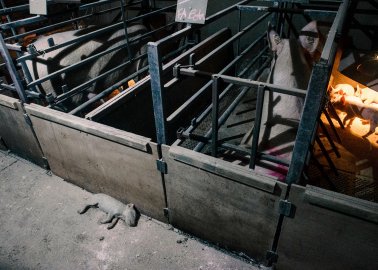Why You Should Never Support Animal-Gifting Programmes
Don’t be fooled by organisations like Christian Aid, Send a Cow, World Vision, Oxfam, and Heifer International that have animal-gifting programmes meant to help eliminate poverty. Most animals in these countries live or work in deplorable conditions with little sustenance, and these programmes often add to the overall suffering rather than reducing it:
Animals End Up at the Abattoir
Around the world, animals raised for food are exploited in a variety of ways. They are forced to undergo cruel procedures such as dehorning and castration without any painkillers. Many are left chained or penned in small spaces or suffer from lingering illnesses or injuries. And when they are no longer considered useful, these animals often face cruel, extremely crowded transport to slaughter and meet a gruesome end when their throats are cut with a blunt knife.
In a 2018 joint exposé by PETA US and Sentient, an eyewitness visited dozens of families in villages throughout Rajasthan, India, where goats donated by Heifer International commonly join those already used by farmers for breeding. See for yourself what these animals endured:
Animal Agriculture Increases Human Hunger Around the World
Animal agriculture is the least efficient way to feed the world’s hungry. It takes more than 7 kilograms of grain to produce less than half a kilogram of meat. Feeding people plant-based foods instead of animal-derived ones is a far more efficient and productive way to meet the nutritional needs of a community. The human body can obtain all necessary proteins, minerals, and complex carbohydrates from sustainable crops of vegetables, grains, pulses, nuts, and fruits.
Putting More Strain on Humans
Such gifts can be an extra burden for communities already struggling for resources like food and water or dealing with harsh environmental pressures such as drought.
Think about it: if a family is having difficulty providing for itself, how can it ensure that animals have adequate living conditions, nutrition, and medical care?
Meat and the Environment
In addition to requiring more resources to produce less food, animal agriculture also has severe negative effects on the environment. It is undisputed in the scientific community that raising animals for food produces enormous amounts of animal waste, which pollutes the air, soil, groundwater, and surface water.
John Burton, director of the World Land Trust, called it “madness” to send goats, cows, and chickens to areas where they will add to the problems of drought and desertification. He said, “The goat campaign may be a pleasing gift and a short-term fix for milk and meat for a few individuals, but in the long term the quality of life for these people will slowly be reduced with devastating effect.”
Human Health Hazard
A lack of adequate veterinary care can harm humans, too. Chickens and other animals are susceptible to zoonotic diseases like bird flu, swine flu, and others that are transmissible to humans around them.
As if these reasons weren’t enough to stop sending animals to developing countries, eating meat is also extremely harmful to human health. Authorities including the British Medical Association have confirmed that people who consume meat and dairy have a greater likelihood of suffering from obesity, coronary heart disease, high blood pressure, and cancer than those who don’t. Medical reports constantly blame the “Westernisation” of diets (i.e. more meat, eggs, and dairy and fewer whole grains, vegetables, and beans) for the skyrocketing rates of heart disease, obesity, and diabetes that nations such as China, India, and Japan are grappling with.
By promoting the consumption of meat, eggs, and dairy, these aid organisations are putting human health at risk. Responsible hunger-relief charities know that the only way to alleviate hunger while benefiting people’s overall health is to encourage them to consume plant-based foods.
Empowering Communities Without Harming Animals
There are many compassionate ways to help communities that don’t condemn animals to suffering and death. Heifer International already has such programmes in place and could easily shift its focus away from using animals to supporting those other initiatives, which include the following:
- Providing access to marketing opportunities for locally produced items
- Teaching literacy
- Installing irrigation pumps and providing training in water resource management
- Supplying fruit and vegetable seeds along with training in farming
- Offering small business training to help women across India gain employment and self-reliance
Make Smarter Choices – Support These Aid Programmes Instead
There is no shortage of humane ways to help people in developing countries, and countless aid organisations already work to raise people out of poverty without harming a hair on an animal’s head. Support their efforts and spread the word about The Fruit Tree Planting Foundation, which plants fruit-bearing trees for communities in need, and Food for Life Global, which serves freshly cooked vegan meals to people in crisis situations and those facing malnutrition.



